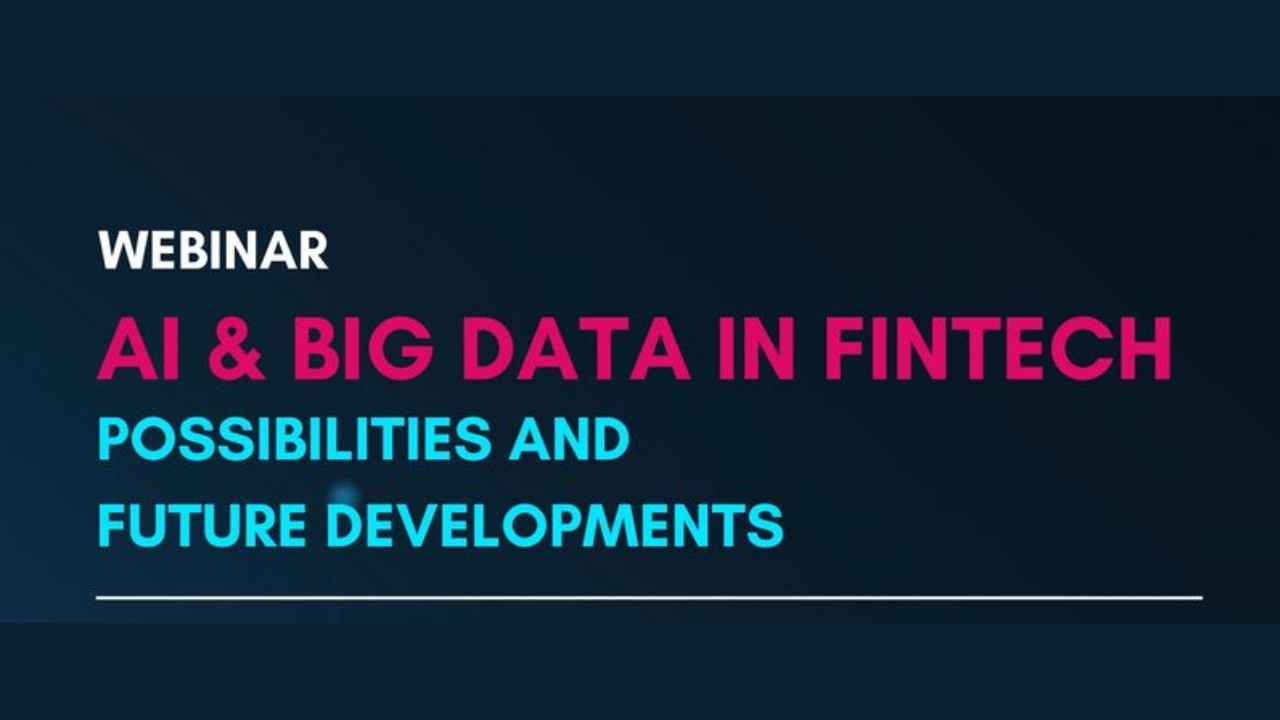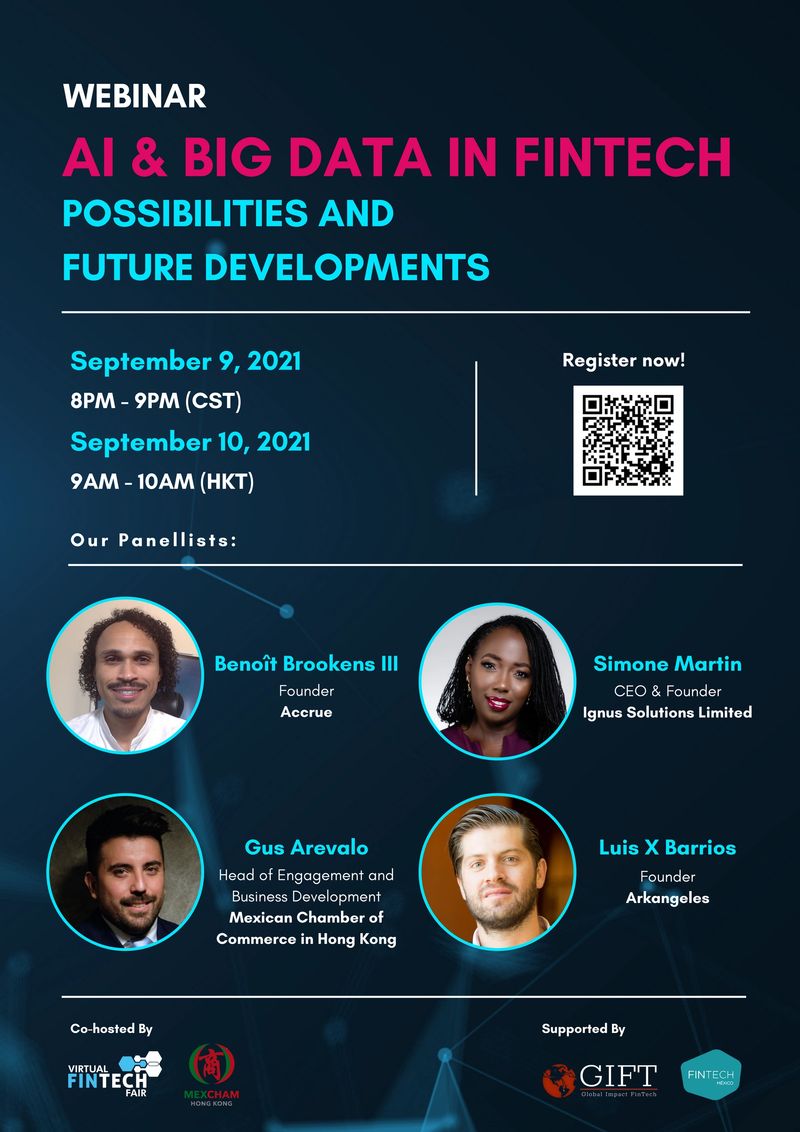AI & Big Data in FinTech: A Regulator's Perspective
Sep 20, 2021
I recently had the opportunity to speak on a panel for the AI & Big Data in Fintech - Possibilities and Future Development Webinar, co-hosted by The Mexican Chamber of Commerce in Hong Kong and Virtual Fintech Fair. I was delighted to have the opportunity to offer my views as both a regulator and a professional with a passion for compliance and ongoing training.

The Effects of the Pandemic on my Areas of Expertise
One of the discussion points centred around ‘How the pandemic affected your area(s) of expertise and what possibilities are emerging as a result.’ It has been my experience that Regulators have never been busier! I am a firm believer in never wasting a crisis. What I have seen is that during the pandemic, Regulators around the world have been able to attack quite a few more of their strategic objectives head-on while participating (virtually) in collaborative groups specific to Regulators. I’ve always been one to enjoy my work as a regulator, and the last 18 months have been invigorating! Regulation is positively taking a huge leap forward in many countries. It does make for extremely demanding days and nights.
From my position at IGNUS SOLUTIONS LIMITED, the pandemic has accelerated online learning tremendously. I have been in the education space for over a decade - having facilitated ICA diploma and certificate level courses in Compliance, AML, and GRC in tandem with my work as a regulator for about 5 years. What I realised from interaction with students and other professionals over the years is that there was a need to bridge these courses with learnings from experience. During the pandemic, professionals have the time to look at more training options and sought training that can help address nagging issues, including the typical sore spots in financial services compliance.
Changes in the Regulatory Space and AI
Another question posed was 'What are the biggest changes that you’ve seen in your area in the last few years, and how has AI accelerated this?'. From my Regulatory hat, Regulators globally have been seeking more data to better monitor and supervise licensees and traditional financial institutions have been providing that information. At present, AI has not yet been widely integrated in either space and therefore, has not yet made the impact that I foresee it having in the future. Algorithms have to be modelled, built, tested, implemented and tested some more. That process takes time, especially where the consequences can be significant.
Both the regulator and regulated can be viewed as being on the backfoot with the disruption innovation heralds. However, some regulatory authorities have the ability to be more nimble on embracing innovators and systems are being reconfigured to use technology. The sheer volume of data and the need for both RAs and Licensees to intelligently integrate and interrogate data for their respective strategic objections will help to drive the adoption of AI.
The Evolution of the FinTech Ecosystem in the near future
I was also asked how I '...foresee the Fintech ecosystem evolving in the next few years..." and what my role within it is. My answer... Persons working in financial services (and other industries) hear about AI and may immediately say to themselves – “I won’t have a job”. That is not the case at all – the nature of jobs will change. For compliance roles, my role through IGNUS is to provide bridge courses which are delivered through online training (and will be expanding).
The core underpinnings of compliance, what is required and how to apply it in practical and useful ways within financial services will need more persons, not less, in the space. There are many reports from notable firms on the challenges of compliance, and the FinTech ecosystem is no exception. Discussions in the FinTech ecosystem around the topic of Regulators are widely varied. Regulatory clarity is critical.
I’d like to add that Innovators can code, but to properly code compliance, you have to know what outcomes you want. There is that, and the fact that Regulators will audit codes and test white papers more rigorously as time progresses.
Key Challenges in the intersection between Regulations and AI Adoption
In the latter discussion of the Webinar, panelists were asked their views on “…the biggest challenges in the intersection between regulations and AI adoption.” My views were that both sides of the Regulatory ecosystem – the regulators and the regulated, the people and firms/organisations – are very much interlinked but do not seem to appreciate that point fully. Distilling my views on the biggest challenges, I surmised three key challenges:-
Challenge #1: Culture around AI
There is a need for a better understanding of how a firm’s culture can impact the adoption of AI. Peter Drucker said that “Culture eats strategy for breakfast, lunch and dinner.” Integrating AI or any material change to progress a firm’s strategic direction is still driven by carbon-based life forms – people!
Challenge #2: Mindsets of Regulators, Firms, Innovators and other Stakeholders
In the FinTech space, there are a lot of misconceptions that have negatively coloured the views of each grouping. Recent developments have helped to shift these views towards being open to collaboration and cooperation – there are those in each grouping that are better than others. However, there are always those that are resistant to change and appear to loathe moving ahead of other players, perhaps trying to play it safe. I do believe mindsets can be changed!
Challenge #3: Ethics in AI and other technological applications
Ethics in AI and other technological applications must remain in the focus of regulators and industry participants. As with everything, AI systems can be corrupted. Technology can be used by bad actors to scale up criminal activities with devastating consequences. Big data can present a tempting ‘honey pot’ rich with information to be exploited. The concern is very real. For example, in the AI space, the development of algorithms with intentional use of ‘dirty data’ or ‘willful’ actions can result in mistrust by the public and slow adoption.
The Nuclear Power of Big Data
Finally, we must consider the reality that Big Data presents to the world. Data has been termed as the new oil. It is not. I prefer the opinion of Chris Humby, that “Data is the new nuclear power!” The potential that data, if unlocked, to drive change and progress within the region and globally cannot be understated. However, the potential that data, if misused, has to create havoc and harm also cannot be understated. The issues to consider are many, and the time in which all market participants have to consider them is quickly passing. Either way, for the greater good, it requires all of us – regulators and innovators – to work together!
Lorem ipsum dolor sit amet, consectetur adipiscing elit. Cras sed sapien quam. Sed dapibus est id enim facilisis, at posuere turpis adipiscing. Quisque sit amet dui dui.
Stay connected with news and updates!
Join our mailing list to receive the latest news and updates from our team.
Don't worry, your information will not be shared.
We hate SPAM. We will never sell your information, for any reason.
